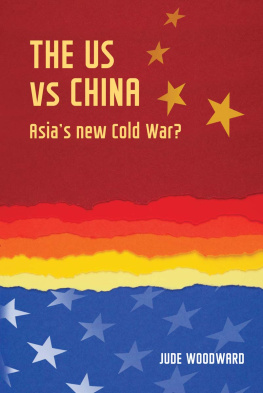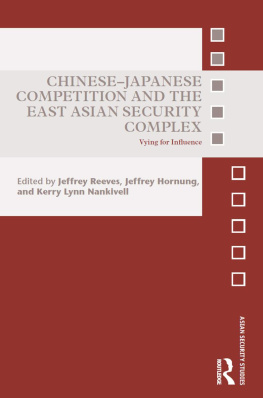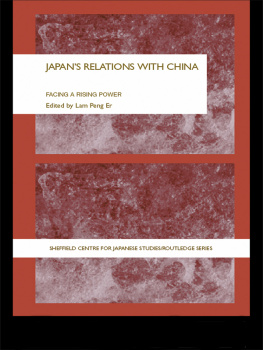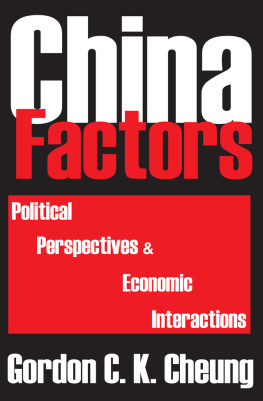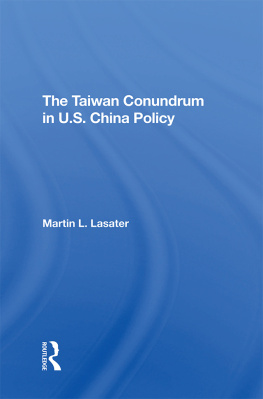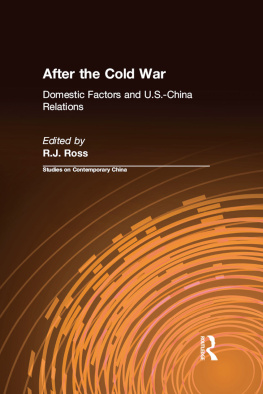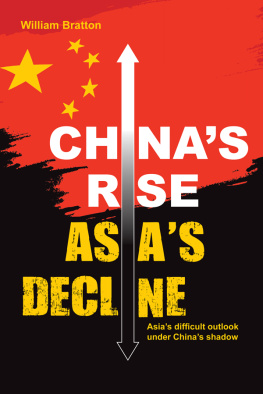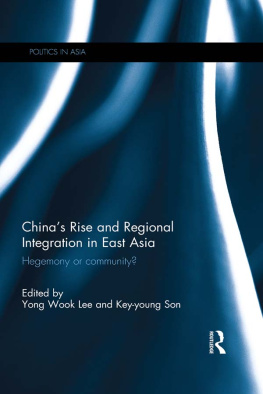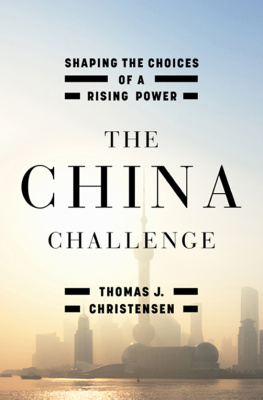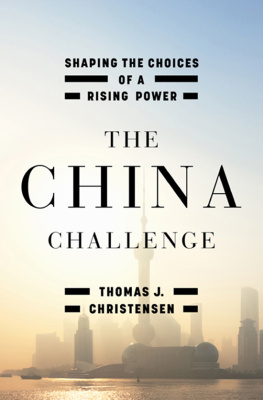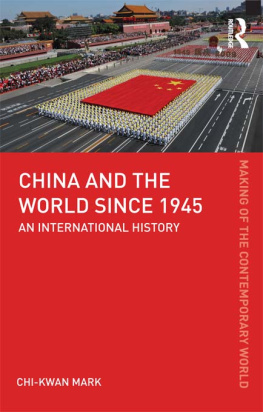The US vs China

Geopolitical Economy
Geopolitical Economy promotes fresh inter- and multi-disciplinary perspectives on the most pressing new realities of the twenty-first century: the multipolar world and the renewed economic centrality of states in it. From a range of disciplines, works in the series account for these new realities historically. They explore the problems and contradictions, domestic and international, of capitalism. They reconstruct the struggles of classes and nations, and state actions in response to them, which have shaped capitalism, and track the growth of the public and de-commodified spheres these dialectical interactions have given rise to. Finally, they map the new terrain on which political forces must now act to orient national and international economies in equitable and ecological, cultural and creative directions.
The US vs China
Asias new Cold War?
Jude Woodward
Manchester University Press
Copyright Jude Woodward 2017
The right of Jude Woodward to be identified as the author of this work has been asserted by her in accordance with the Copyright, Designs and Patents Act 1988.
Published by Manchester University Press
Altrincham Street, Manchester M1 7JA
www.manchesteruniversitypress.co.uk
British Library Cataloguing-in-Publication Data
A catalogue record for this book is available from the British Library
ISBN 978 1 5261 2199 8 hardback
ISBN 978 1 7849 9342 9 paperback
First published 2017
The publisher has no responsibility for the persistence or accuracy of URLs for any external or third-party internet websites referred to in this book, and does not guarantee that any content on such websites is, or will remain, accurate or appropriate.
Typeset in Gill Sans by
Servis Filmsetting Ltd, Stockport, Cheshire
To
Redmond ONeill
19542009
Always missed, especially when writing this book
Contents
Select bibliography
All the maps that appear in this book were created by James David Smith, who retains the copyright on their use in any other context.
There are many to whom I am indebted in one way or another in the writing of this book and I apologise for anyone missed.
The greatest contribution of anyone was Redmond ONeill, to whom this book is dedicated, even though he didnt know that I would write it. But over more than three decades we discussed all the fundamental issues covered in it and many more. These discussions, and the reading and reasoning that flowed from them, formed my views and way of thinking more than anything else in my life. His critical and agile mind as well as his sense of fun and love of life made an impression on all who met him, and I was privileged to know him so well and share so much with him.
I owe particular thanks to John Ross, senior fellow at the Chongyang Institute for Financial Studies at Renmin University, Beijing, whose work on the Chinese economy provided the backbone for the economic material in this book, especially in , and who originated the figures and tables.
I am also hugely grateful to Keith Bennett who, often over a good Chinese meal, has been a source of ideas, facts and critiques that were invaluable to the process of writing this book. Keith read the manuscript in exemplary detail and pointed out many weaknesses, which I have tried to correct.
I would like to particularly thank my editor, Radhika Desai, who subjected every page of the manuscript to rigorous criticism, challenged every argument, pointed out many extraneous and unnecessary diversions and altogether made this a much better book than it was when I started out. It was sometimes painful, but in the end entirely worthwhile. I would also thank Alan Freeman, who had faith in this book, relentlessly pursued helping me find a publisher, and, with Radhika, spent generous amounts of time helping to refine my original proposal and thereby the content of this book.
There are many people who have contributed to my thinking on the subject of this book. I have had many discussions on developments in world politics and the economy with Barry Gray, Michael Burke, and other friends and colleagues, which are reflected in these pages. These others particularly include Kate Hudson, general secretary of CND, with whom I have not only discussed these issues over years, but whose love, friendship and support helped in many other ways.
I am extremely grateful to James Smith who produced all the maps that appear in this book. And to everyone at Manchester University Press who helped me through the editing and publishing process.
I strongly believe that it is necessary to spend time in China to understand how Chinese people and their government see the world and to appreciate how strongly this contrasts with how China is seen in the West. My links with China originated when I was in Ken Livingstones Londons Mayors Office, to which I owe the opportunity to get to know China. Working on Londons Chinese New Year led to my first trip to China to arrange cultural exchanges. As a result of that I had responsibility for setting up and organising the London promotional offices in Beijing and Shanghai. In 2008 I oversaw the Beijing Olympic torch relay in London, where I learned from Fu Ying, ambassador to London at that time, how China saw the Olympics as an opportunity to present the treasures and depth of Chinese culture to the world in the way that China had received Shakespeare, Sherlock Holmes and Hollywood from the West, but without the unfair treaties and colonial occupations. And also during the torch relay I received an object lesson in the capacity of powerful lobbies to whip up such extreme hostility to China that it completely obscured what China was trying to say.
The links I made through this period led to my time teaching at Shanghai Jiao Tong University and lecturing elsewhere in China after 2008. In this context I must thank my friends, Liu Tongbo and Zhao Bingbing, neither of whom have any responsibility for the contents of this book, but the many discussions I had with each of them taught me so much about China, how it sees itself and the rest of the world.
To conclude, I want to thank my friend Helen Shaw for her wisdom and affection. And the doctors at Guys Hospital thank you NHS for their care when I fell ill and needed major surgery during the writing of this book.
Last but not least my thanks to my family: to the family that made me my mum, brother, Patrick, and sister, Laura, and much-missed dad; and my own little family. Particularly love and thanks to my husband, Rod Robertson, especially for putting up with my bad temper when the writing wasnt going so well! But mainly to him and my darling stepdaughters Katy and Mary for the love, laughs and good times together that make any endeavour possible.
A2/AD Area Access/Access Denial (military capability)
ACFTA ASEAN-China Free Trade Area
ADB Asian Development Bank
ADIZ Air Defence Identification Zone
AIIB Asian Infrastructure Investment Bank
APEC summit Asia-Pacific Economic Cooperation summit
APT ASEAN Plus Three (China, Japan and South Korea)
ASEAN Association of Southeast Asian Nations
BCIM Bangladesh, China, India, Myanmar
BCP Burmese Communist Party
BJP Bharatiya Janata Party
BRIC/BRICs Brazil, Russia, India, China
BRICS Brazil, Russia, India, China, South Africa
CELAC Community of Latin American and Caribbean States
CFR Council on Foreign Relations
CIA Central Intelligence Agency
Next page
